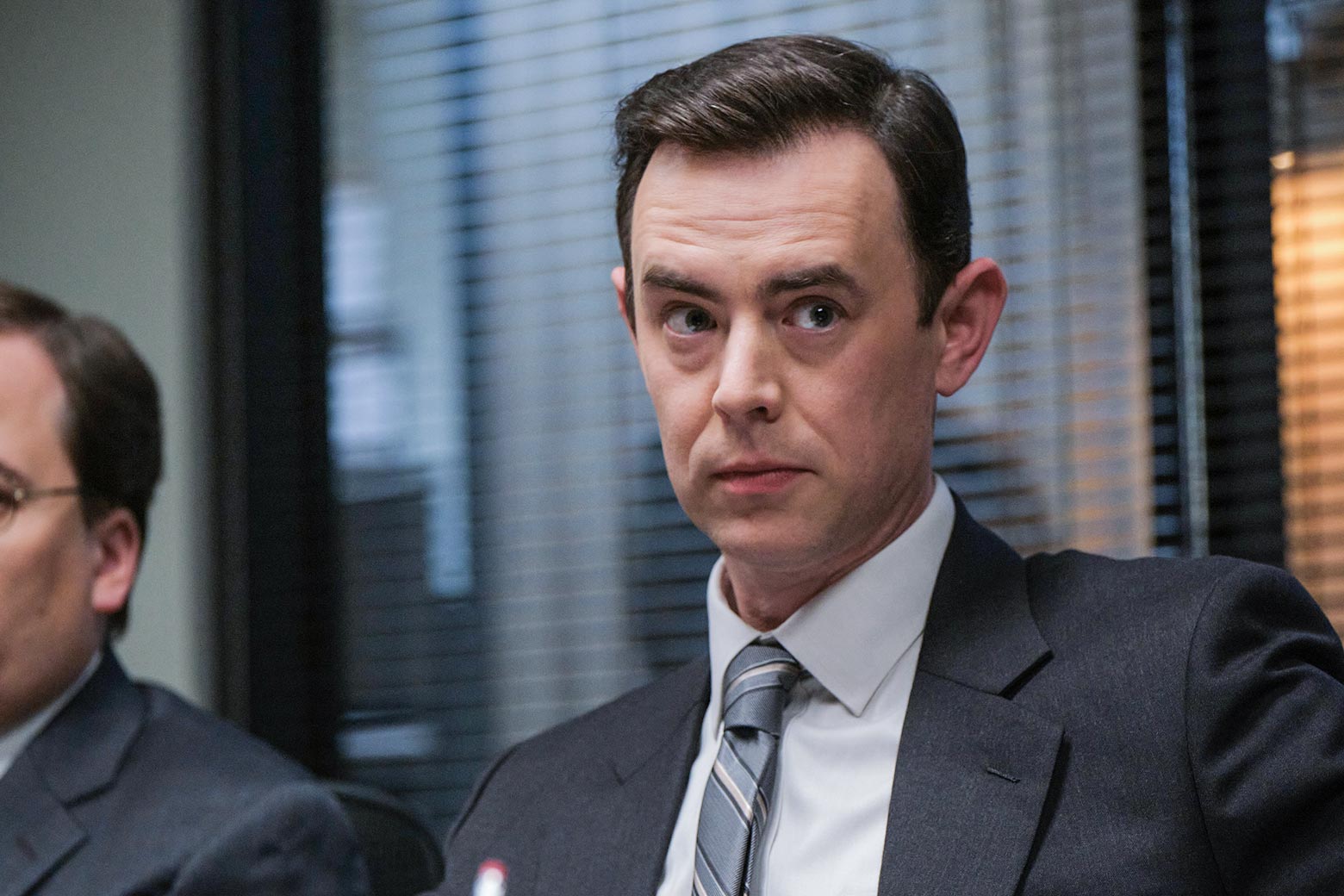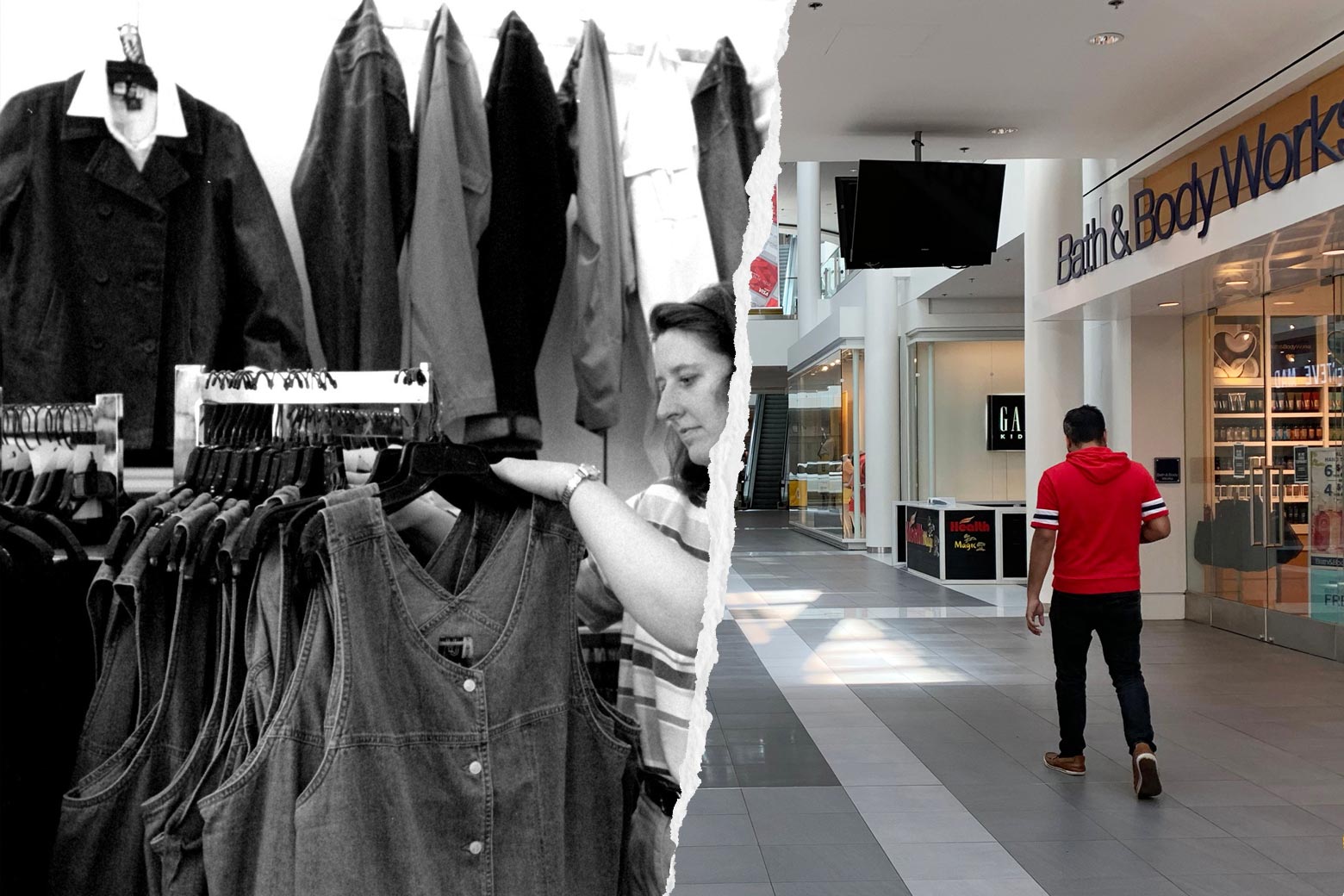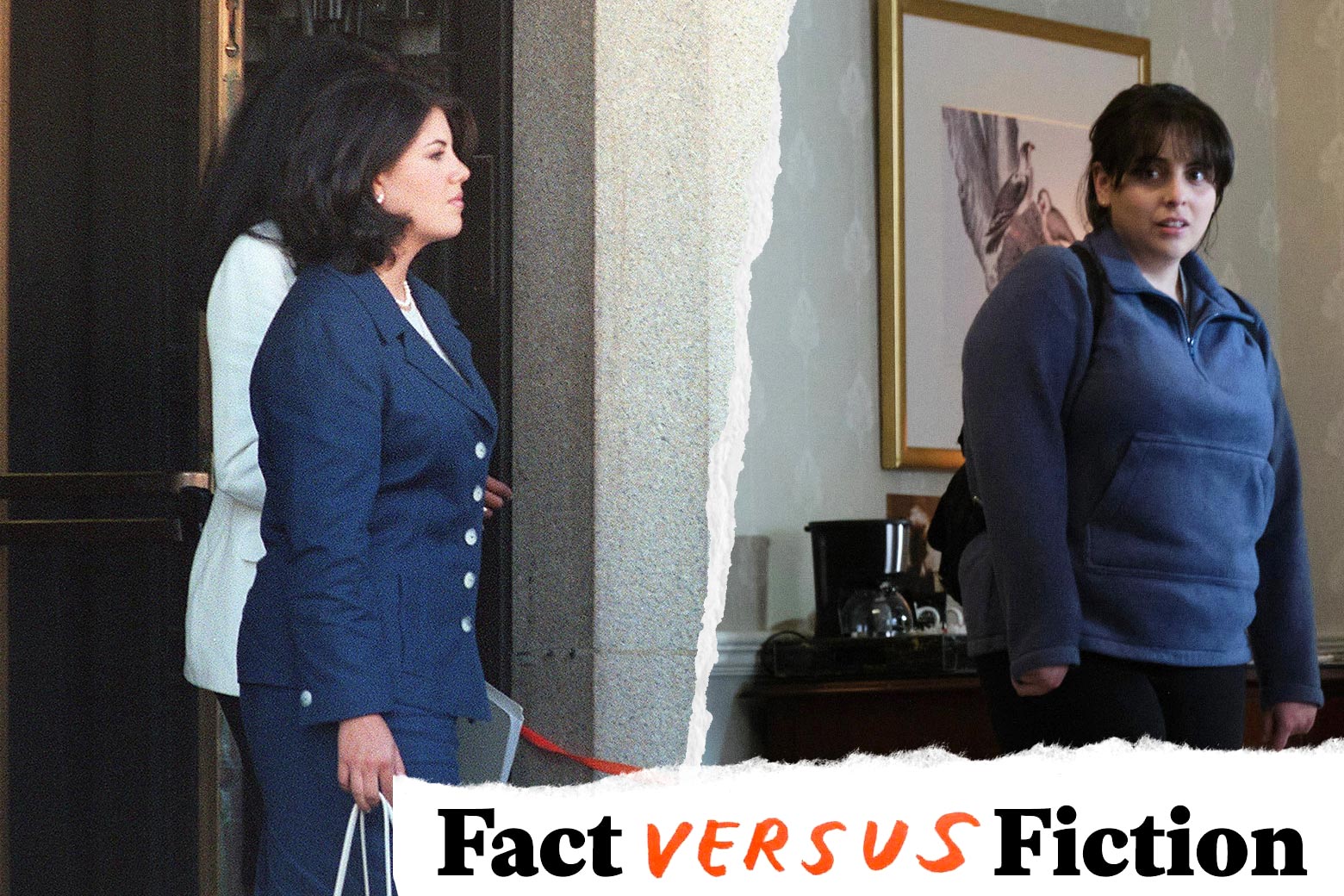Episode 6 of Impeachment: American Crime Story focuses on one pivotal incident, the questioning of Monica Lewinsky in a Ritz-Carlton hotel room for 11 hours (with breaks) by members of special prosecutor Ken Starr’s team. The series’s first episode ended with a bewildered and frightened Lewinsky being escorted by FBI agents from the mall food court where she’d been lured by Linda Tripp for coffee, which is where this episode picks up the story. At first the vibe in the room is that of a pack of hounds cornering a terrified rabbit, but Lewinsky displays more inner steel than you might expect. Meanwhile, hotel bathroom handsets have a rare moment in the spotlight as suspense accelerators. We look at how accurate or otherwise this depiction of her detention and interrogation is.
Lewinsky Took a Break With a Prosecutor and an FBI Agent at Crate & Barrel
Lewinsky insists she won’t make a decision about whether to cooperate until she speaks to her mother, Marcia (Mira Sorvino), which leaves Lewinsky, the prosecutorial team, and the FBI agents with not a lot to do for the four hours it will take Marcia to get to Washington by train (she’s scared of flying). Lewinsky persuades the authorities to let her get out of the room for a while and, shadowed by prosecutor Mike Emmick (Colin Hanks) and an FBI agent, heads for Crate & Barrel.

This sounds like a surreal, Veep-like piece of invented detail, but it is absolutely true. Lewinsky was an inveterate shopper, so it’s not out of character that she would seek a bit of retail therapy for relief from a highly stressful situation. According to Slate’s Slow Burn podcast, “As evening fell, Lewinsky told the prosecutors she was feeling claustrophobic, and that she wanted to stretch her legs. Emmick and one of the FBI agents agreed to accompany her back to the Pentagon City Mall, where they could wander around a bit and get some semblance of fresh air. And so, the three of them went shopping. The first stop on the excursion was Crate & Barrel, where Lewinsky looked at household goods and tried to lighten the mood by cracking jokes.”
And, as depicted in the episode, Lewinsky then joined her monitors for an equally surreal dinner at a Pentagon City Mall restaurant, Mozzarella’s American Grill, before being escorted back upstairs to the hotel interrogation room. In between, under pretense of going to the ladies’ room, she frantically tried to call Bill Clinton’s secretary, Betty Currie, from a pay phone to warn the president of the perjury trap being set, but Currie didn’t pick up. One can only imagine how the course of history might have been different if she had.
Did Starr Underestimate Lewinsky?
The Starr team is under time pressure because Newsweek reporter Michael Isikoff’s article revealing the existence of Linda Tripp’s tapes will appear in 48 hours, and tomorrow morning Clinton is scheduled to be deposed in the Paula Jones civil case. Since the Republicans’ impeachment strategy depends on Clinton perjuring himself by denying an affair with Lewinsky, it is essential that the president does not learn this affair has become known to the Starr prosecution and Jones’ lawyers. The prosecutors also want Lewinsky to wear a wire for future conversations with Clinton, Vernon Jordan, and Betty Currie in the hope that they will incriminate themselves by offering the so-far-elusive quid pro quo for Monica’s silence. Starr’s pit bull Jackie Bennett thinks it will be a piece of cake to get Monica to agree, predicting, “Young girl, white-collar crime—simple witness like that takes less than an hour.
In his 2018 memoir, Contempt, Starr admits his team misjudged Lewinsky: “It was becoming increasingly clear: in thinking she was a naive, starstruck young woman in love who would quickly cooperate, we underestimated her. In her determination to protect the president, Monica kept a team of experienced FBI agents and career prosecutors twiddling their thumbs for much of the day.” He asserts, “Monica doubtless calculated that if she could maneuver the situation, she would skate from criminal prosecution and at the same time not turn on the president.” Clueless groupie or scheming minx—there is no middle ground. The possibility that Lewinsky was acting instinctively out of loyalty seems to be entirely discounted.
Even with hindsight, Starr still underestimates her, characterizing her in the memoir as a sort of petulant teenager being told she can’t go to the prom (in fact the code name for the detention was “Prom Night”), noting, “For an hour, Monica screamed, she cried, she pouted, and complained bitterly about her scheming, no-good, so-called friend,” instead of seeing her as an isolated and terrified young woman in a room full of men who are threatening her with lengthy imprisonment if she doesn’t make a life-changing decision right away.
Did Lewinsky Want Tripp to Watch?
Tripp has been put in a bedroom adjoining the suite where Lewinsky is initially being questioned. When a door opens and Lewinsky catches sight of the FBI hustling her former friend out of the room, she shouts: “Make her stay and watch. I want that treacherous bitch to see what she has done to me.”
This is verbatim what Lewinsky said at the time, according to Andrew Morton’s 1999 book Monica’s Story, which was written with Lewinsky’s cooperation, although Morton maintains Tripp was actually in the room for the early part of questioning, not sequestered in a bedroom.
Did Lewinsky Contemplate Suicide During the Interrogation?
When the prosecutors reveal Tripp taped her conversations with Monica and that the tapes are now in their possession, Lewinsky is not slow to grasp the implications. “My life is over,” she gasps. When she takes her time returning from a trip to the suite’s bathroom, Emmick finds her in a bedroom, contemplating throwing herself out of the window.
According to Lewinsky, this also actually happened. She told Britain’s Channel 4 News in a 1999 interview that she considered throwing herself out of the 10th-floor hotel window.
Did Starr’s Prosecutors Stop Lewinsky From Calling Her Lawyer?

On being told she could be facing federal charges for multiple felonies including perjury and obstruction of justice, Lewinsky repeatedly asks to call her lawyer, Frank Carter. The prosecutors, while not outright forbidding her, repeatedly try to put her off the idea. Bennett tries to undermine her faith in Carter, saying he’s a civil case lawyer when she needs a criminal one (in fact, he’d been a public defender for six years). The prosecutors also say that if she shares anything about what they’ve said, even with her lawyer, the offer of immunity for cooperation will be withdrawn. With Lewinsky still insisting on waiting for her mother before she’ll decide anything, the prosecutors let her call Carter, but by then it’s 4:45 and he’s left for the day.
In reality, the prosecutors did repeatedly discourage Lewinsky from phoning her lawyer, finally allowing the call to Carter even later, at 5:23 p.m. They had an incentive: Their biggest leverage was the perjury charge Lewinsky could face as a result of lying about her affair with Clinton in the affidavit sent to Paula Jones’ legal team. However, at the time of the questioning, that affidavit had not yet been filed in court in Little Rock, Arkansas. Had Lewinsky reached Carter, he could have called FedEx to cancel delivery of the affidavit.
Because the prosecutors knew Lewinsky had a lawyer, they were on thin ice questioning her at all; Justice Department guidelines generally prohibit prosecutors from having direct contact with people under criminal investigation who have legal representation, especially while negotiating cooperation. The purpose of the restriction is to prevent ordinary people from being taken advantage of by the prosecutors’ superior knowledge of the law. Starr’s office would later argue Lewinsky did not fit the definition of a “represented party” because Carter had been hired to help in a civil, not criminal, matter.
In a subsequent inquiry into Lewinsky’s questioning and detention, lawyers working for Starr’s successor as independent counsel found that “the Department requires far greater respect for an individual’s choice of attorney, for attorney-client relationships, and for the role of defense attorneys in the process than that exemplified in this case.” The report, completed in 2000, remained sealed for another 14 years for reasons that are unclear.
